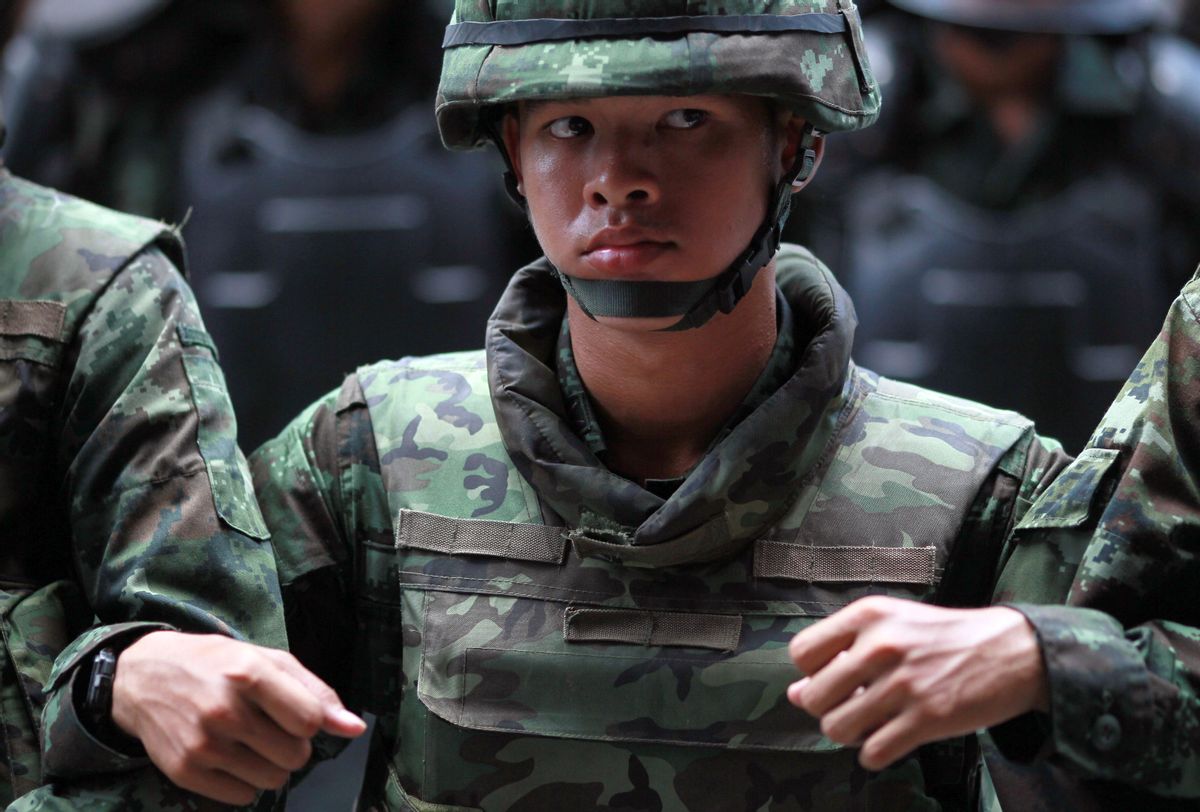BANGKOK (AP) — After six months of political deadlock, protests and deadly violence, Thailand's military seized power in a coup and scrapped the constitution on Thursday. It was the country's second coup in eight years and 12th since the end of the absolute monarchy in 1932. Here's a summary of events and a guide to understanding what is happening.
HOW IS THE COUP PLAYING OUT?
While most of Thailand has been calm, with little if any military presence seen on the streets of the capital, hundreds of anti-coup activists have held protests in central Bangkok. Troops dispersed demonstrators on Friday evening, detaining at least two people.
On Saturday, the demonstrators vowed to march to a nearby army base, but soldiers with riot shields prevented them. They later began walking to Victory Monument, a major city landmark about 9 kilometers (5.6 miles) away. Rows of soldiers and police were lined up on a road near the monument to stop the protesters.
Life in much of Bangkok, however, appeared normal, though a curfew remained in effect from 10 p.m. to 5 a.m. Restrictions on TV broadcasts and on posting inflammatory comments on social media also remained, and many Thais were reluctant to comment publicly on the coup.
KEY FIGURES SUMMONED
The coup leaders have summoned former Prime Minister Yingluck Shinawatra, Cabinet members and anti-government protest leaders and said Saturday that they would be detained for up to a week to give them "time to think" and to keep the country calm. They also summoned outspoken academics.
The army said the detainees were being well-treated and that the aim of the military was to achieve a political compromise.
The military also summoned 35 other people, including more politicians, political activists and, for the first time, outspoken academics, to "maintain peace and order." One of those on the list, Kyoto University professor of Southeast Asian studies Pavin Chachavalpongpun, said from Japan that he would not turn himself in.
"The military claiming to be a mediator in the Thai conflict, that is all just nonsense," Chachavalpongpun said. "This is not about paving the way for reform and democratization. We are really going back to the crudest form of authoritarianism."
THE WORLD REACTS
Several nations have condemned the coup. The United States, Thailand's key ally, suspended $3.5 million in military aid on Friday, and State Department spokeswoman Marie Harf said Washington was reviewing a further $7 million in direct U.S. assistance. The U.S. also recommended Americans reconsider any non-essential travel to Thailand.
British Foreign Secretary William Hague said his country looked to Thai authorities "to set out a quick clear timetable for elections to help re-establish the democratic framework of governance.
U.N. High Commissioner for Human Rights Navi Pillay urged Thailand to "ensure respect for human rights and a prompt restoration of the rule of law in the country." Human rights groups, including Human Rights Watch and Amnesty International, criticized the detentions of political leaders.
THE GENERAL IN CHARGE
The powerful army chief, Gen. Prayuth Chan-ocha, who announced the military takeover on television, defended the move as necessary to restore stability amid increasing spasms of violence that together with controversial court rulings had rendered the government powerless. He briefed foreign diplomats Friday about the coup and said the lifespan of the ruling military council would depend on how soon the current political conflict can be eased, Foreign Ministry Permanent Secretary Sihasak Phuangketkeow said.
He said Prayuth told them a reform council would be established along with an interim government, and that they would lead to an eventual election.
Prayuth, 60, is known for his loyalty to the monarchy, especially to Queen Sirikit, having served in the 21st Infantry Regiment, known as the Queen's Guard. Both Prayuth and his predecessor and mentor, former army chief Gen. Anupong Phaochinda, played key roles in the 2006 coup that toppled former Prime Minister Thaksin Shinawatra, Yingluck's brother.
WHAT LED TO THIS?
Street protests started in November against then-Prime Minister Yingluck, and she dissolved the lower house of Parliament in a failed bid to ease the crisis. A court ousted her for nepotism this month but left the ruling party in place. Anti-government protesters wanted to install an unelected prime minister to make unspecified reforms they said would root out corruption and remove the Shinawatra family's extensive influence from politics.
In first declaring martial law on Tuesday, the army said it needed to restore order. Last week, grenades fired at an anti-government protest site in Bangkok left three people dead and more than 20 injured. At least 28 people have died in protest-related violence since November.
Prayuth assumed the role of mediator by summoning key political rivals for their first face-to-face talks since the political turmoil escalated six months ago. Meetings on Wednesday and Thursday among bitter enemies failed to break the deadlock before Prayuth announced the coup.



Shares